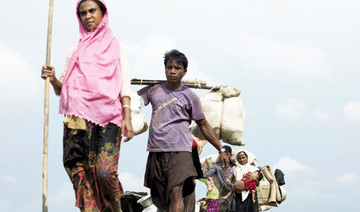KABUL, Afghanistan: Frozan Ahmadzai is one of 200,000 Afghan women who have the Taliban’s permission to work. She should have graduated from university this year in pursuit of her dream of becoming a doctor, but the Taliban have barred women from higher education and excluded them from many jobs.
Now, instead of suturing, she sews in a basement in Kabul. Instead of administering medication, she makes pickles.
Half of Afghanistan’s population now finds itself locked out of the freedom to work at a time when the country’s economy is worse than ever.
Few jobs are still available to women. They include tailoring and making food, which the 33-year-old Ahmadzai now does along with women who once were teachers or aspired to be one.
Women’s participation in the workforce in Afghanistan, always limited by conservative cultural beliefs, was 14.8 percent in 2021, before the Taliban seized power and imposed harsh restrictions on women and girls. They include banning female education beyond sixth grade, barring women from public spaces like parks, and enforcing dress codes.
Women’s participation in the workforce was down to 4.8 percent in 2023, according to World Bank data.
Ahmadzai’s eyes flare when talking about the new reality for Afghan women. “We are only looking for a way to escape,” she said, referring to the work in the basement. It’s a step, at least, beyond being confined at home.
But profits are slim for her and her 50 colleagues in the collective. In a good month, the pickle-making and tailoring businesses bring in around 30,000 afghanis ($426).
The women also have other complaints familiar to anyone in Afghanistan: The rent and utility bills are high. The sewing machines are old-fashioned. The electricity supply is erratic. Local retailers don’t compensate them fairly. They don’t receive support from banks or local authorities to help their businesses grow.
Just obtaining permission from the Taliban to work is challenging for women, though under Afghan labor laws, the process for work permits ought to be the same for both sexes.
The ministry responsible for issuing permits has banned women from its premises, setting up a female-only office elsewhere. It’s to “speed things up and make things easier” for women, said a spokesman for the Ministry of Labor and Social Affairs, Samiullah Ebrahimi.
There, women submit their paperwork, including their national identity card, a cover letter and a health certificate from a private clinic. That’s assuming they have the documents along with the money to cover any costs. It also assumes they can move around without being harassed if unaccompanied by a male guardian.
Last year, a top United Nations official said Afghanistan had become the most repressive country in the world for women and girls. Roza Otunbayeva, head of the UN political mission in Afghanistan, said that while the country needed to recover from decades of war, half of its potential doctors, scientists, journalists and politicians were “shut away in their homes, their dreams crushed and their talents confiscated.”
The Taliban have a different view. They have tried to provide women with a “safe, secure and separate” working environment in line with Islamic values and Afghan traditions in sectors where women’s work is needed, according to ministry spokesman Ebrahimi. They can work in retail or hospitality, but it must be a female-only setting.
He said women don’t need degrees for the majority of permissible work including cleaning, security screening, handicrafts, farming, tailoring or food manufacturing.
It’s heartbreaking for Ahmadzai and her colleagues to see their expertise go unused. Several also were training to be makeup artists, but beauty parlors have been closed.
Some jobs for women remain in education and health care, so Ahmadzai has pivoted to a nursing and midwifery course so she can become a medical professional. But not a doctor. The Taliban don’t want more female doctors.
The challenges for Afghan women of obeying Taliban edicts while helping to support their families while living conditions worsen is a strain on health, including mental health.
Ahmadzai said one of the few positives about her work in the basement in Kabul is the camaraderie and support system there.
“Afghan women nowadays all have the same role in society. They stay at home, care for children, mind the house and don’t work hard,” she said. “If my family didn’t encourage me, I wouldn’t be here. They support me because I work. My husband is unemployed and I have small children.”
Salma Yusufzai, the head of Afghanistan Women Chamber of Commerce and Industry, acknowledged that working under Taliban rule is a challenge.
The chamber has almost 10,000 members, but the lack of female representation within the Taliban-controlled administration is a challenge.
Yusufzai said the chamber supports women by giving them a platform at local markets and connecting them with the international community for participation in overseas exhibitions and other opportunities.
Chamber members include key Afghan industries like carpet-making and dried fruit. The businesses are male-owned but kept alive by women who want to support the economy, which she said would collapse without them.
She acknowledged that the chamber’s limited work was only possible through engagement with the Taliban: “If I close the door then nothing will happen, nothing will remain.”
Yusufzai once had three gemstone businesses and gave them up because of her chamber role. But she can’t own them anyway under Taliban rule, so the businesses are in her husband’s name.
“Since we are living in this country, we have to follow the rules,” she said. Her smile was tight.
“From nothing, it is better to have something.”
An Afghan woman wanted to be a doctor. Now she makes pickles as the Taliban restricts women’s roles
https://arab.news/5tw2w
An Afghan woman wanted to be a doctor. Now she makes pickles as the Taliban restricts women’s roles

- Few jobs are still available to women
- Just obtaining permission from the Taliban to work is challenging for women

























